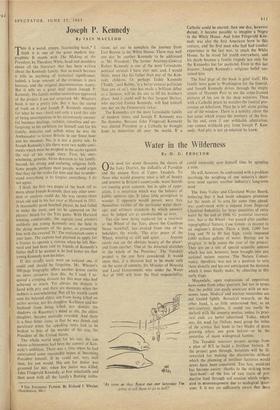Joseph P. Kennedy
By IAIN N IACLEOD
I think the first two pages of the book tell us more about Joseph Kennedy than any other anec- dote or analysis could do. He was twenty-three years old and in his last year at Harvard in 1911. A reasonably good baseball player, he had failed to make the team, and yet he appeared on the players' bench for the Yale game. With Harvard winning comfortably, the captain (and pitcher) suddenly put young Kennedy into the field in the dying moments of the game, so presenting him with the coveted 'H.' The explanation came a year later. The captain had planned to apply for a licence to operate a cinema when-he left Har- vard and had been told by friends of Kennedy's father thal.if he wanted it, he had better see that young Kennedy won his letter. If this scruffy story were an isolated one, it could and should be forgotten. Mr. Whalen's 500-page biography offers another dozen stories no more attraotive than this. As I read, I ac- quired a creeping distaste for this man who had achieved so much. Yet always the distaste is laced with pity and there are moments when the sadness is overwhelming. Not all his wealth could save his beloved eldest son from being killed on active service, nor his daughter Kathleen and her husband from being killed, nor dismiss the shadows on Rosemary's mind as she, .the eldest daughter, became mentally retarded. And there is a finai bitter irony in that he was dumb and paralysed when the appalling news had to be broken to him of the murder of his son, the President of the United States.
The whole world wept for his son, the son whose achievement had been the summit of Ken- nedy's ambition. There was a time when he had entertained some reasonable hopes of becoming President himself. If he could not, very well then, his son would. His son Joe junior was groomed for this; when Joe junior was killed, John Fitzgerald Kennedy, at first reluctantly and then soon with all the family's flaming enthu-
* THE FOUNDING FATHER. By Richard J. Whalen. (Hutchinson, 60s.)
siasm, set out to complete the journey from East Boston to the White House. There may well one day be another Kennedy to be addressed as 'Mr. President.' The former Attorney-General Robert Kennedy is one of the most formidable political animals I have ever met, and, I would think, more like his father than any of the Ken- nedy children. Or perhaps Teddy Kennedy (`Teddy,' said Bobby, 'is a better natural politician than any of us'), who has made a brilliant ddbut as a Senator, will be the one to fill his brother's place. And it could well be that Sargent Shriver, who married Eunice Kennedy, will find himself one day on the Democratic ticket.
The Kennedys are the most formidable family of modern times, and Joseph P. Kennedy was the dynamo. Because John Fitzgerald Kennedy was elected President as a Catholic he brought hope to minorities all over the world. If a Catholic could be elected, then one day, however distant, it became possible to imagine a Negro in the White House. And John Fitzgerald Ken- nedy was also the first American born in this century, and the first man who had had combat experience in the last war, to reach the White House. So he stood for youth everywhere, and his death became a family tragedy not only for the Kennedys but for mankind. Even in this last disaster, Joseph Kennedy's religious belief sus- tained him.
The final page of the book is grief itself. His family have gone to Washington for the funeral, and Joseph Kennedy drives through the empty streets of Hyannis Port to see the crepe-framed pictures of his son in the shop windows. Then with a Catholic priest he watches the funeral pro- cession on television. Then he is left alone gazing out of the window. There is a nobility about the last scene which erases the memory of the first. In the end, even if one withholds admiration, one cannot withhold pity from Joseph P. Ken- nedy. And pity is not an emotion he knew.






































 Previous page
Previous page